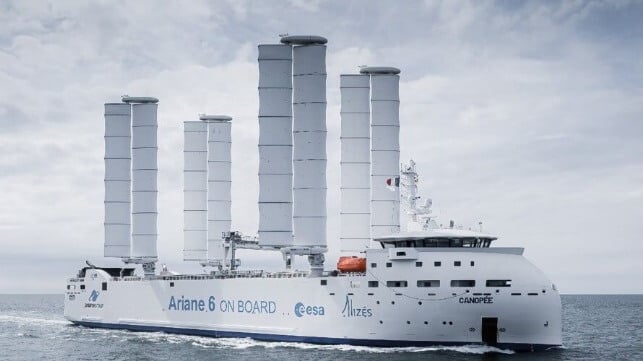Sail-Assisted Ro-Ro Demonstrates Fuel Savings in Two Years of Service

Two years after its launch, Canopée, the first cargo vessel equipped with four automated OceanWings rigid sails, has demonstrated the potential of wind-assisted propulsion according to the joint venture between Jifmar and Zéphyr & Borée, which operates the vessel for the Ariane rocket program. Further, they report that despite a demanding transatlantic schedule, the vessel has improved its results through software refinements.
The 5,500 dwt Ro-Ro was constructed by the Neptune Shipyard in Poland and undertook its first trials in December 2022, followed by a test voyage from Bremen, Rotterdam, Le Havre, and Bordeaux to the South American launch site. The sails were fitted the following July.
The sails are each just over 120 feet in height with a surface area of 363 square meters, and consist of two flaps, one forward and one aft, and can also be collapsed. The design makes it possible to adjust the angle of incidence of the wings, which turn 360 degrees in relation to the wind, while the rear flap can pivot around the secondary mast to create a camber in relation to the front flap.
Canopée, which is 400 feet (122 meters) long, was the first large-scale hybrid sailing cargo ship. The companies said it would serve as a model for a new generation of wind-assisted propulsion. It was designed to transport components of the Ariane 6 rocket between Europe and French Guiana,
After two years of service, they are now reporting that the integration of the OceanWings sails has not only improved fuel efficiency but also demonstrated the reliability and uptime performance of wind-assisted propulsion for merchant shipping.
On average, they report each wingsail already saves 1.3 tonnes of fuel per day under Canopée's normal operating conditions, corresponding to approximately 300 kW of equivalent engine power per wing sail, or a total of 5.2 tonnes of fuel (20.8 tonnes CO2 equivalent) per day and 1200 kW of equivalent engine power for the four OceanWings.

that matters most
Get the latest maritime news delivered to your inbox daily.
The performance of the OceanWings on Canopée is projected to further increase thanks to the constant improvement of the OceanWings Software & AI platform. On one of the most recent transatlantic voyages, Canopée delivered average savings of 2.2 tonnes per day per wing sail, corresponding to 510 kW of equivalent engine power saved per wing sail, or 2MW of equivalent engine power for the entire vessel. Canopée was also achieved 13.7 knots under sail power. On average over the past two years on Canopée, OceanWings also showed 99.6 percent operational availability.
Alizés, which operates the vessel, says that they expect the results will further the implementation of sail-assisted propulsion. It continues to look to deploy the wing sail concept on additional and larger vessels.
